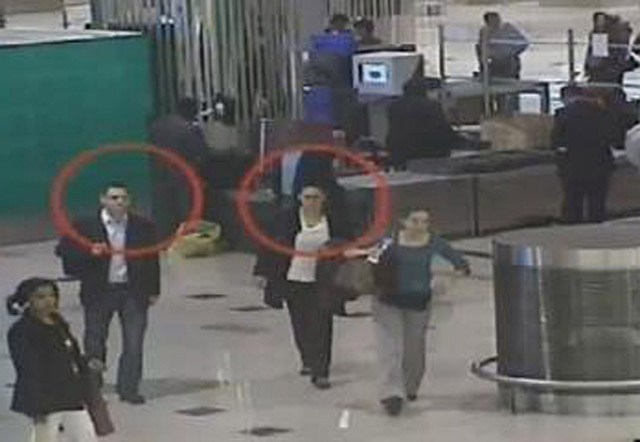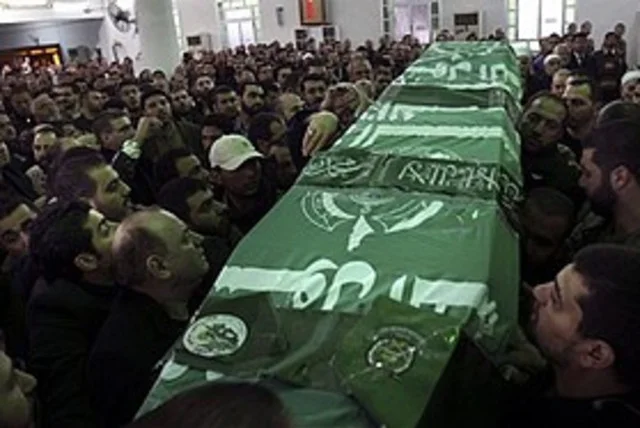Mahmoud al-Mabhouh, who was in charge of relations between Hamas and Iran, arrived in the United Arab Emirates in January 2010. Mabhouh used to get there from time to time, where he felt comfortable. The UAE is the business centre of the Middle East, and business people worldwide flock to it, including Iranians.
According to Mabhouh, it was possible to hold meetings with Iranian Revolution Guards operatives and businessmen in UAE without attracting much attention.
Mabhouh was paranoid after at least three assassination attempts on his life had failed. He was a target, he knew it, and tried to conduct himself with maximum secrecy and security.
Mabhouh was an experienced operative, a “battle fox” with extensive intelligence and operational experience, responsible for coordinating arms shipments from Iran to the Gaza strip. He was the one that implemented Hamas’ plans to equip itself with strategic weapons such as long-range ballistic missiles, anti-aircraft missiles, and possibly anti-ship missiles. And yet, for no apparent reason, in January 2010, he came alone to Dubai without security guards.
The intelligence for the operation was accurate
The members of the operational squad had arrived in the UAE several days before Mabhouh arrived there. The intelligence knew when he was expected to land, where he would stay, with whom and when he was expected to meet. The terrorist organization Hamas claimed in retrospect, that Mabhouh’s email box had been hacked, and all information about Mabhouh’sexpected movements had been learned in advance.
The squad was held on the field. The hotel and its surroundings were well studied; the ways of accessing and withdrawing from the hotel, the conduct within the hotel, what the floors looked like and how to get to them, as well as the set of cameras in the hotel were well studied.
The operational plan was prepared, studied, and tested in the field before Mabhouh arrived at the hotel. The assassination squad came to Dubai several times to study and check out the various hotels and Mabhouh’s accommodation potential.
Time is pressing; there is no time for a second chance
Mabhouh landed in the afternoon from a direct flight from Damascus at Dubai Airport on January 20 with a fake Palestinian passport under the name Mahmoud Abdul Rauf Muhammad. One operational squad waited for him as he exited the airport, following him and examining his steps. He does not remain even for a moment without them.
About half an hour after landing, he drives to the Al BustanRotana Hotel and books a room there. The operational squad is already set up inside and outside the hotel. Their purpose is to gather intelligence and further secure the operating team.
The first team, whose job was to check where Mabhouh will be staying, is ready. When Mabhouh turns to the elevators, they follow him. Two team members, dressed in tennis clothes and equipped with racquets, go upstairs in the elevator with him. “The room number is 230,” they pass on to the squad members.
Mabhouh stays in his room, refreshing, taking a short break, the last one he will take in his life. After about an hour, around 4:30 p.m., he leaves his room and goes to a meeting. The surveillance team, in secret and without being discovered, followed him.
A few minutes after Mabhouh leaves the hotel, a “random” guest with a French passport arrives – Peter Elvinger. Peter booked a specific room. Room number 237, the one in front of Mabhouh’s room. The room is vacant, and Peter gets the room’s card key. But Peter never went up to the room. Instead, he handed the card key to another team member, Kevin Devron (Irish passport holder), who was in the lobby waiting for the key. Kevin arrived with a woman, Gail Polliard, who also has an Irish passport, on a flight from Paris.

Kevin and Gail went to room 237 about 15 minutes after Mabhouh left the hotel. They are preparing the front command post for the operation in the room. The operating team started its preparation.
About two hours later, around 18:30, four more team members arrived at the hotel, did not linger in the lobby, and went straight up to room 237. Using sophisticated equipment that they infiltrated into Dubai when they arrived in the country, they managed to duplicate the card key and code Mabhouh’s room, located in front of them in the hallway.
Towards 8:00 PM, the operating team, staying in room 237, moves to Mabhouh’s room and waits for him impatiently and probably even with frayed nerves. The front command room was closed and abandoned.
The team following Mabhouh reports to the operating team on Mabhouh’s expected arrival at the hotel, about half an hour after the staff was held there. Mabhouh ascends to his room, the heartbeat of the team members goes up. They hide in the dark room, waiting for Mahbuh to come in and turn on the light.
After Mabhouh enters the room, the team members quietly attack him, holding him and injecting him with poison, which spreads rapidly through his body, killing him, leaving no marks. So it would appear that Mabhouh died a natural death.
The team takes off Mabhouh’s clothes, puts him in his pajamas, and puts him to “sleep” in his bed.
The whole event is run professionally and lasts about twenty minutes, and a little before 08:45 PM, the team leaves the room, closing the chain from the inside. So that the death in bed story would look more natural. About an hour later, the operating crew is already leaving Dubai, boarding a plane, and disappearing.
The cleaning staff at the hotel did not enter the room for about 17 hours. Only at noon on the next day, the body of the “old man” was discovered in his bed.
The local police are called to the incident scene, but the death seems like a natural death, which has nothing to do with the Dubai police. An initial medical report explains that the cause of death is a rise in blood pressure in the brain.
But this euphoria will not last long
Hamas representatives called the Dubai police, talked to the police chief, DhiHalfan, and reported that Mabhouh had disappeared. Khalfan, who understands the sensitivity of things, begins an investigation.
The police investigation relies on sophisticated equipment which allows the recovery of photos and videos from surveillance cameras in the hotel and its area, face recognition, cross-referencing of active cell phones in the area, and cross-referencing information with the border police. Halfan and his men did a good and thorough intelligence analysis; they turned over all “the stones,” used all means and cross-reference information.
About two weeks later, on February 15, Dubai police released photos of 11 murder suspects. The suspects were documented entering Dubai several times and entering the hotel, the operating room, and Mabhouh’s room. The passports of all the suspects are European passports – from Germany, the UK, Ireland, and France.
But Halfan does not stop there. He found that some of the suspects’ European passports carried Israeli names and even held Israeli passports. Moreover, some of the European passports used were genuine.
A few days later, Dubai police announced that they had managed to link the team members, apparently by combining COMIT (Communication Intelligence) systems and photos. As a result, a total of 33 suspects involved in the murder were discovered.
Another man, Uri Brodecki, was arrested in June later in Poland for aiding and to abetting a forged German passport for the team. Poland extradited Brodecki to Germany, where he stood trial and was fined 60,000 euros.
Team members were not apprehended or identified with their true identities. Israel, for its part, has never publicly acknowledged and admitted that it is behind the assassination operation.
European passports have created a diplomatic crisis between Israel and the United Kingdom, Ireland, and Australia.
After the operation, some arguments were heard about how the team might have been unaware of the security cameras in the hotel and the city. But this argument, it seems, has nothing but inexperience in the operational world.
Indeed, it is challenging to find hotels with no security cameras. Such an operation, if required, will be done under these conditions, with the understanding that the operators will be pictured. However, they will do all they can to reduce their exposure to a minimum. Therefore, the team members used means to blur their identities, such as wigs, fake mustaches, and more.
In the operational context, the operation will prove in later years that in a world of biometric passports, image processing capabilities, smart information fusion, and shared databases for law enforcement organizations – it is very difficult to carry out covert operations. Difficult, but possible.
Despite the media noise, the operation goal was achieved, and Mabhouh was assassinated. It was a severe momentary blow to the terrorist Hamas’ procurement organization. Hamas, together with Iran, studied the operation, learned operational and intelligence lessons on their operations, and apparently improved their ability to maintain secrecy.
Whether carried out by Israel or another country, such assassination is momentarily shocking and shakes the opponents’ existing operational and intelligence infrastructure. Any such assassination is a stopping point and self-examination of leaked sources from within. Any such assassination is also a warning call to those coming in line, to the deputies, who must be careful if they decide to continue their predecessor’s path.
Yet, such assassinations have no real strategic impact in the long run. They produce a “blow on the wing,” shaking the heart, but over time do not harm the force-building processes and terrorist organizations’ operations.
It should be mentioned that Mabhouh’s predecessor, Sheikh Khalil, was also killed in Damascus in 2006. Mabhouh quickly and successfully got into Khalil’s shoes immediately after his assassination. Even if the “snake’s head” is cut off in these terrorist organizations, they know how to quickly adapt to the new reality and act in it without fear.
It should be mentioned that an assassination programme was also launched against Iran’s nuclear programme, which is naturally attributed to Israel, even though it never took responsibility.
Over the years, about 11 scientists and personnel from the Iranian nuclear industry have been assassinated. However, these assassinations, along with cyber-attacks and mysterious explosions in Iranian nuclear facilities, didn’t significantly delay Iran’s nuclear programme. Instead, the Iranian nuclear program is mainly delayed through political moves, sanctions, and economic warfare.
–The writer is a former commander served in the Israeli navy for 23 years. A PhD in Defense and Security Studies, he was a senior consultant at the Israeli National Cyber Directorate. He is a recipient of various Israeli awards including Prime Minister’s Decoration of Excellence. The views expressed are personal and do not necessarily reflect the views of Raksha Anirveda





